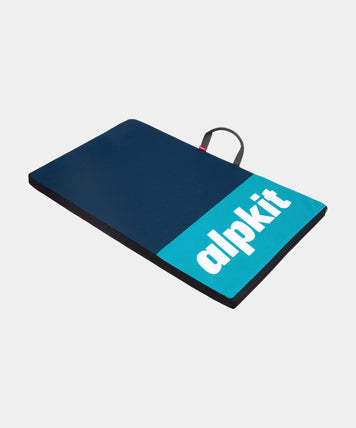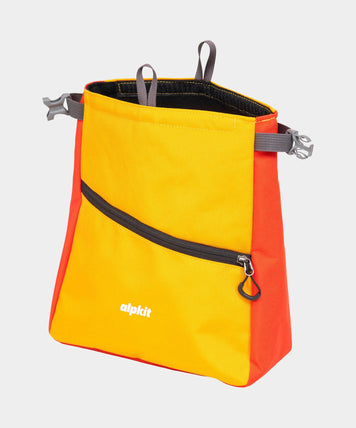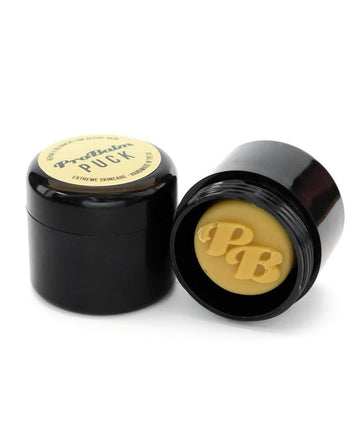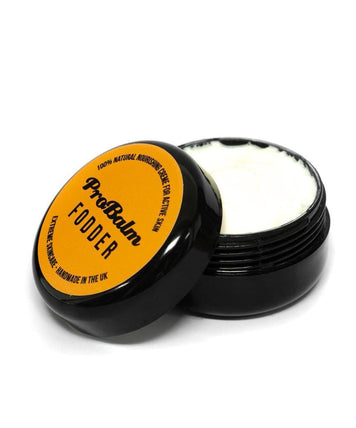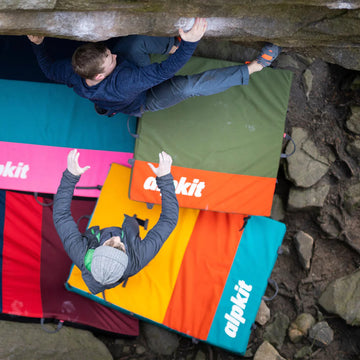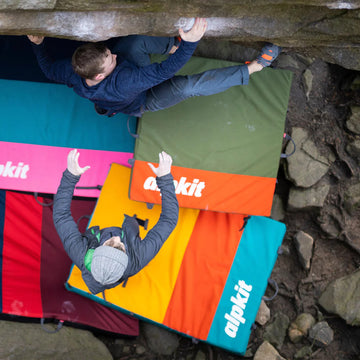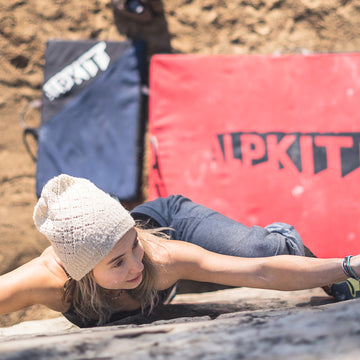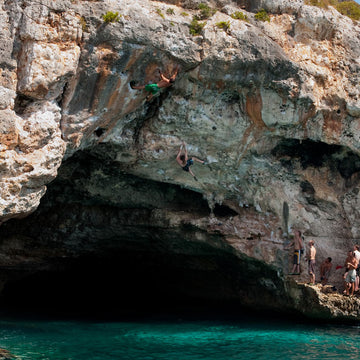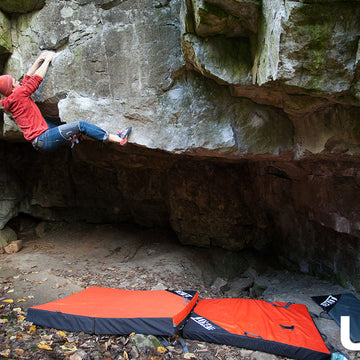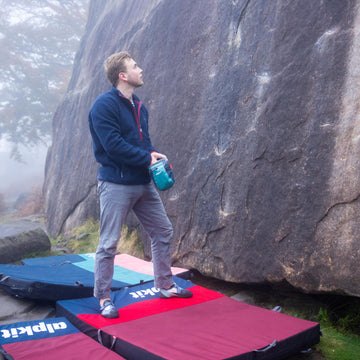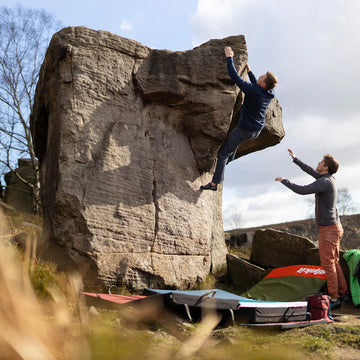
New bouldering pads cushion your crash with a solid landing every time. Designed by climbers, for climbers, so you can focus on the route, not the fall.
Bouldering pads were one of the first things we designed. We have more experience than we’d care to disclose in falling off boulder problems. In fact, we’ve fallen off boulders all over the world, so it was only natural that we’d want to make things that we could fall onto.
If you haven't seen our new bouldering pad range, Hebe and Nick will give you a quick intro in this video. Otherwise, scroll down for more on the thinkng behind the new range.
Why change our boulder pad range?
So we’ve always designed pads, but it wasn’t until 2011 that we realised we could make them ourselves here at HQ. We’re proud of our pads, both as individual products as well as how the range fits together, but.
there’s always a ‘but’! Over the last few years bouldering has boomed, with new walls popping up in every town and helping more and more people get into climbing. The bouldering community has evolved and become more diverse, so we decided to take a fresh look at our bouldering pad range to meet these new requirements.
What does this mean for the range?
On face value, you can get a feel for the range simply by looking at the sizes of the pads. Bouldering culture may be diversifying, but in some ways the boulderer’s needs aren’t that different. On the one hand there are people pushing themselves on highballs, on the other there are gym climbers looking to explore what nature has to offer – either way you want the reassurance of a big pad and some satellite pads to orbit them. We’ve built our new range to reflect this.
There are also Nissan Micra owners like EllyfromHQ who want pads they can fit in their cars (with passengers!). As a more streamlined pad, the Phud was always a hit with these types of climbers, so we have brought it forward into our new range with only a few tweaks.



How big, or small, is a boulder?
What is essential to a bouldering pad?
There’s more than just size to consider! A bouldering pad is fundamentally designed to stop it from hurting when you fall off a boulder. So there are three absolute essentials:
-
The foam is going to protect you from the fall.
-
The outer fabric is going to protect the foam from everything else (bogs, rocks, beingstuffed in the boot, etc.).
-
You can comfortably carry it (and all your other stuff) to the bottom of the boulder problem in the first place.
These were our essentials, we’d get this part nailed and all the bells and whistles could come after.
1. The foam is going to protect you from the fall
The first thing you’ll notice in our new range is that the foam is thicker than previous incarnations of our products. The purpose of this is twofold: firstly, thicker foam works better with the refreshed shapes of the pads; secondly boulderers are increasingly after thicker foam.
Our pads tend to feel firm in comparison to other brands, this firmness doesn’t necessarily mean you’ll get a hard fall. What it does mean, however, is that your fall will be better supported – protecting your heels and ankles - and your pad will last longer.
Mujo and Origin are designed to cover the majority of boulderers’ needs, so it was important to find a good balance between protection on higher falls and comfort on smaller falls. We chose to use two layers of foam: open cell to absorb impact and cushion the smaller falls and closed cell to prevent you from bottoming out on higher falls.
The Project is made to handle repeated big falls, so we added another layer of closed cell foam to give you the extra support from the high falls and more protection against rocks or uneven ground beneath the pad.
If you want to really geek out with us on foam, read our High Perfoamance develop post.
2. The outer fabric will protect the foam
One of the major changes in our pad range is the corners, which are now squared off (yes, really, it’s a big deal to us!). Pads with squared off corners fit together better, with less gaps in between, giving you a safer setup. They’re also far easier to stack.
The trade-off for square corners, however, is durability. Our bouldering pads are made here at in the factory at AKHQ. This gives us plenty of scope for both trying and testing fabrics, and looking at how we can construct our pads to be as hardwearing as possible. We’ve opted for 1100 denier Cordura, which we are experienced in working with. Over the years, this fabric has proven it can stand the test of time and a good dose of use and abuse, and more than compensates for the squared-off corners when it comes to durability.
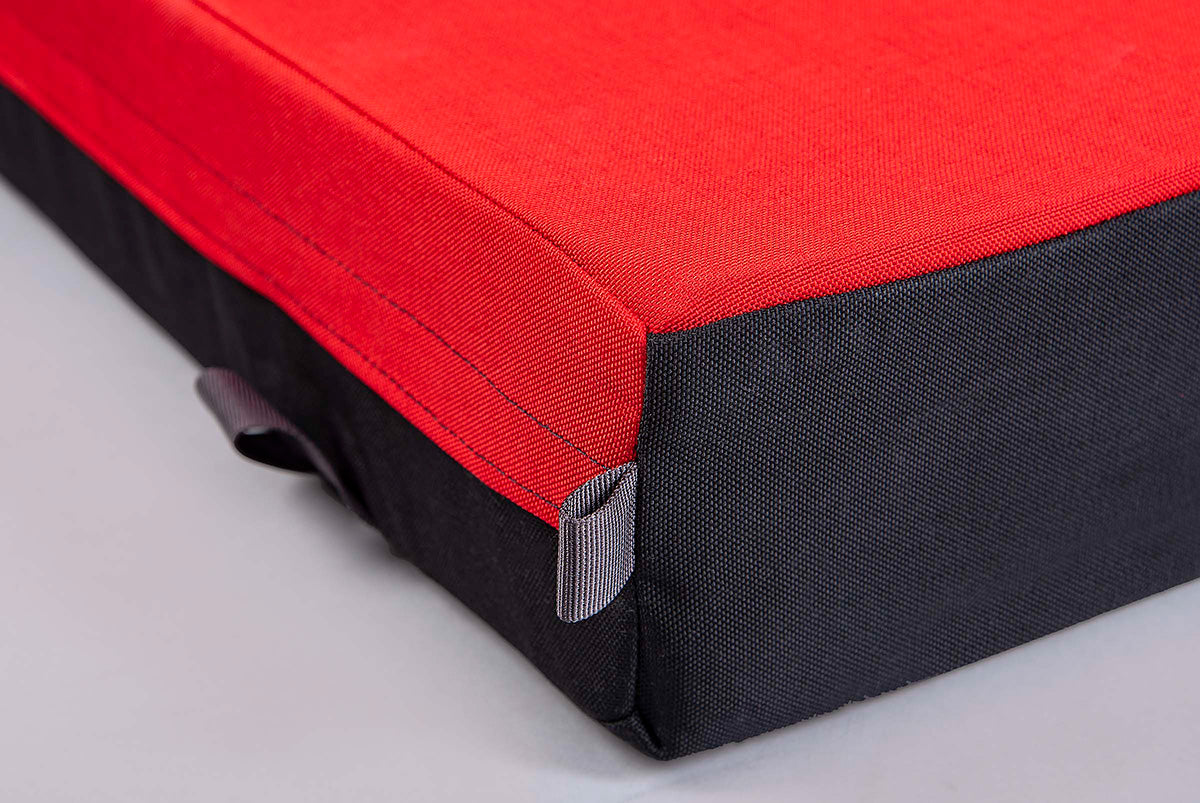

3. You can comfortably carry it
There’s no point in having a great pad if you can’t carry it to the crag. With the exception of the streamlined Phud, our full pads feature rucksack straps and hip belts to make them more comfortable to carry.
Due to its size and weight, portability was a big point of discussion for the Project pad. We used a thermoformed rucksack back panel – such as you might find on our UK made packs – to make it comfortable to carry on the long walk-ins to your project.



So that’s our new bouldering pads! Head over to our bouldering pads page to take a look at the range.
Main image: Zofia Reych climbing inRocher Fin,Fontainebleau | Photo credit: Andy Day
Further reading
How to choose a bouldering pad
The beta on buying a bouldering pad.
High Perfoamance
Read this article for some in-depth foam beta.
UK Made by climbers
We have over 10 years of experience making pads, find out more about our design criteria.
Safer Landings for Bouldering Landings
A pad does not give you carte blanche to climb without due care and attention. If you're new to climbing outdoors, read these tips on climbing and falling.
Bouldering with multiple crash pads
More pads are better than one pad! Using multiple pads brings its own challenges, Ashleigh explains what to look out for.
Got specific needs? We make our pads in the UK so get in touch and we will do our best to help.
Keep your pad going longer
Looking after your bouldering pad, how to replace foam, repair your shell, clean and store it.

